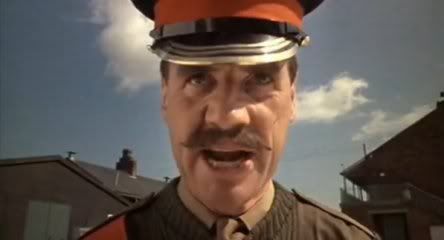
"We praised the Almighty far beyond what any reasonable entity would have felt comfortable with, and blessed many, many things." - ETHAN COEN in his short story "I Killed Phil Shapiro"
What kind of sane, rational, responsible God would actually want to be worshiped? Shouldn't God be embarrassed by all those flattering hymns, prayers, and ceremonies -- not to mention wars -- in His honor? You'd think so, but a good portion of the Old Testament is given over to God's all-consuming desire to be venerated and obeyed by the people He created. In fact, according to many of His most fervent admirers, God still disapproves of such practices as birth control, homosexuality, and divorce because they deprive Him of earthly offspring. After all, fewer babies mean fewer worshipers, and He can't tolerate that. So be fruitful and multiply, everybody, and if you're a destitute Catholic ex-mill-worker with 70 hungry Catholic children and no income with which to support them, well, you can always sell the little buggers for medical experiments.
These were among my thoughts as I recently re-watched Monty Python's The Meaning of Life for what must be the fiftieth time. I "discovered" this 1983 film, the troupe's last proper group effort, during the early 1990s when I was still in high school, and I'm happy to report that it is still able to make me laugh -- and think -- all these years and viewings later. In fact, when screening the DVD in preparation for this article, I chortled loudly at the antics of Michael Palin's buffoonish Sgt. Major and John Cleese's fawning French-accented Maitre D', even though I knew in advance everything these men were going to say and do. If anything, time has given this film a luster it might not even have had when it was originally released. Nowadays, when "comedy" largely consists of pop culture in-jokes, jaundiced snark, and infantile male bonding, a comedy as audacious and ambitious as The Meaning of Life is a thrill.
And yet, even today, the film does not get the respect that it perhaps deserves from critics, viewers, and even the Pythons themselves, who are divided as to the film's merits. Mention The Meaning of Life on any film-related Internet forum, and you'll get the same few standard complaints. Perhaps foolishly, I will try to address these one by one. Let's see now...
1. The film is "uneven."
Ah. I see. So "evenness" is what you are seeking from comedy? Equanimity? Parity? Is that it? Hmmm. This is a curious view indeed, though a depressingly common one these days. I think the rise of the word "uneven" as a critical cliché -- and it is a loathsome one, as are most clichés -- mirrors the ascent of mood-stabilizing drugs like Paxil and Prozac. With our moods now nicely evened out, we now seek predictability and consistency in all facets of our lives, including our entertainment. How sad. You will forgive me for disagreeing with the majority viewpoint on this. I, for one, think evenness has no place in comedy. Sideburns and wallpaper should be even, but not art and definitely not humor. A comedy should, by design, be a jagged series of highs and lows, not a flat line. In the last ten years or so, most film comedies have not aimed particularly high. They've sought -- and reached -- a middle ground, aiming for a general sense of vague amiability rather than big laughs or big ideas. In short, "evenness" is all around us, and yet this has not created a golden age for screen comedy. I tend to side with William Allen White, who defined "consistency" as "a paste jewel that only cheap men cherish." And when Berkeley Breathed describes Jim Davis's "Garfield" as being "consistent," he does not mean that as a compliment. Incidentally, there are two full-length Garfield movies which may well supply the elusive "evenness" you seek from the filmgoing experience.
2. The movie is too "dark" and "mean."
Well, now you are coming out into the open. Poor widdle baby. Dat bad ol' movie hurt your itty bitty feewings. Being a delicate snowflake, you clearly feel that comedy is meant to comfort us, give us a hug, fix us a mug of cocoa, and tell us to keep up the good work. Is that what you're looking for? A gold star and a pat on the back? Again, you and I see things very differently. I feel that comedy exists to point out the absurdities of the world and hold them up for ridicule. Comedy exposes fraud and dishonesty. Comedy slices through pomposity and hypocrisy in the interest of truth, even if the truth is unpleasant. It's tough to do all that and be nice about it. The Meaning of Life is not always a gentle movie, but I don't think its intention is to be cruel. I think of the film more as constructive criticism. We can all stand a little of that, can't we? Besides, compared to a lot of the truly dark, nihilistic comedy so easily found on television and the Internet, The Meaning of Life is comparatively gentle. It ends, after all, with a plea for peace and understanding. Yes, that plea is directed specifically at fish, but still, a plea's a plea.
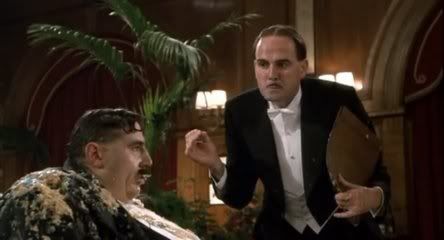
3. The movie's "style" overwhelms its humor.
Oh, come now. You can't be serious about this one. You are? Well, all right, I suppose I can be bothered to refute this canard as well. Of course, this is a matter of personal taste, but I think the movie looks very impressive throughout and that the cinematography, costumes, and production design add immensely to the viewer's (i.e. my) enjoyment. But you, obviously, think a comedy should be plain, spartan, unadorned, and as close to the no-frills "Dogme 95" aesthetic as possible. Is that right? Yet again, your views and mine are irreconcilable. I feel that making a comedy in no way excuses the director from the responsibility of delivering a fundamentally well-crafted film. Movies, even humorous ones, are essentially Things To Look At, as I've said before, and should therefore be visually stimulating rather than drab, flavorless, and ugly. Like any other films, comedies ought to keep the viewer's eye constantly engaged. I admit that's an old-fashioned view, especially in the YouTube era when comedy is largely doled out to us in the form of clips that run five minutes or less, are shot on cell phones and webcams, and are viewed at roughly the size of a beer coaster. The Meaning of Life is, without apology, a Big Film for the Big Screen. I don't really see how the film's "style" overwhelms it at any point. In fact, when revisiting the film, I was grateful that director Terry Jones frequently lets the comedy play out in longer takes, rather than the hack-and-slash editing style we see too often today
In this and numerous other ways, it doesn't really fit with any of the present-day paradigms for humor. It's not deadpan. It's not a mockumentary. It's not about loveable man-children getting into wacky shenanigans and learning something along the way. Well, it sort of fits that last one, but not in the Old School/Hangover way. Most of our top-grossing screen comics in 2010 -- the good ones and bad ones alike -- desperately want to be loved. They want to seem like regular guys, perhaps the idealized drinking buddies we never had. Think of Jack Black, Will Ferrell, Adam Sandler, etc. Every last one of 'em wants to be our bestest friend in the whole wide world, and each one suffers from a serious case of Peter Pan Syndrome. Python's not like that. They never were. Here's critic Danny Peary describing the troupe in his book, Cult Movie Stars. If you skip my entire half of the article, at least read this following passage carefully:
Most unusual is that the Python characters are rarely sympathetic. The actors themselves don't have audience-endearing physical quirks (a big nose, a big belly, a weakling's body, bad eyesight) but are imposing men (even when dressed as women), physically and intellectually, who are always on the attack.
The key word here is "men." Whereas most of our current screen comedians are overgrown boys (often with scolding, joy-killing wives and girlfriends), Monty Python is about the often-intimidating world of men. Throughout The Meaning of Life, we see adults dealing with adult problems like war, religion, commerce, sex, death, and -- yes -- the meaning of it all. The cast of characters in this film is rife with authority figures -- headmasters, priests, doctors, businessmen. The world presented in this film is often harsh and unsettling. This film is not here to tell us what we already know and reassure us that we're doing just fine. But, again, it's not nihilistic either. The truly "dark" humorists of 2010 -- found mainly on the Internet and occasionally on cable television -- seem to be operating under the motto, "Nothing ultimately matters, so let's piss wherever we want." To me, that's nearly as unsatisfying as the false comfort of the male bonding comedies at the other end of the spectrum. A film like Monty Python's The Meaning of Life stands as an alternative to both of these viewpoints. I wish there were ten more films like it coming out each year.
I realize that I've not really described or reviewed the film at all so far. I apologize for that, but you have to understand my perspective here. When I was preparing for this article, I read many reviews of the film, and eventually the repetitive, predictable complaints about it really started to irritate me. Here we have six of the funniest men of the Twentieth Century operating at the peak of their powers, giving us this comedy that is -- to me -- light years beyond what generally reaches our cineplexes today, and all people can do is nitpick it to death. You just want to throw up your hands. The last live-action comedy I saw in a movie theater was a film called Grown Ups. You know, the one with Adam Sandler, Chris Rock, Kevin James. Yeah, those guys. Like The Meaning of Life, the Sandler film stars a group of famous TV sketch comics approaching middle age and purports to take on some larger issues of life. But it's also one of the laziest, hackiest films I've ever seen. A good portion of the screen time is given over to the film's stars just sitting in Adirondack chairs reciting lame one-liners. I'm not kidding -- Adirondack chairs! We allow this unambitious drivel to reap untold fortunes at the box office, while we complain that The Meaning of Life has too much "style" or isn't "even" enough? This film is comedic manna from heaven, and we're checking the "Nutrition Facts" on the back. Gah!
This movie is too good for us. We don't deserve it. We can't have nice things.
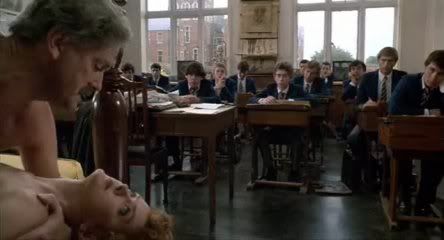
Ladies and gentlemen of the jury, this Monty Python fan who stands before you has no choice but to cop a plea of guilty to the charge of referring to The Meaning of Life as "uneven." He has done so on numerous occasions and will most likely continue to do so as long as the film work of that venerable troupe comes up in conversation, which he hopes will be for many years to come. In his defense, he would like to point out that he also considers The Meaning of Life to be his favorite Python film -- and not just because he's a contrarian by nature. Whereas Holy Grail easily wins the popularity contests and Life of Brian is the strongest in terms of narrative, The Meaning of Life lives and dies on the strength of its material, and while he contends that some of it isn't as sharp as it could be, the bountiful highlights more than compensate for the occasional comedic lull.
Nevertheless, there are a number of reasons why The Meaning of Life doesn't necessarily leap to mind when people are asked to name their favorite Python film. For one thing, it was their last cinematic outing, so there are those who may automatically assume there was a concurrent drop-off in quality and therefore tend to underrate it. For another, unlike their previous escapades it was actually financed by a major studio (in this case, Universal, which was soon to cause much trouble for Terry Gilliam when it came to the American release of his masterpiece Brazil), so there may be a lingering perception that it was born of compromise and studio tampering. Then there are the widely publicized interviews where the Pythons themselves -- John Cheese and Terry Jones chief among them -- have repeatedly said that the film didn't come together as well as it should have. Between Cleese's oft-stated claim that sketch films invariably run out of steam after an hour or so and Jones's assertion that the script was one rewrite away from being wholly unified, there's a lot of fodder for the argument that The Meaning of Life is somehow less than the sum of its parts. But why split hairs when the parts are so wonderful in and of themselves? Accordingly, it's tempting to go through the film sketch by sketch, but that would probably yield few insights beyond what one can glean from reading its Wikipedia entry. Rather, it would be more instructive to look at the contributions of each individual Python.
Graham Chapman: After playing the leads in both Holy Grail and Life of Brian (which precluded him from taking on too many supporting characters), Chapman must have chomping at the bit to play as many different parts in this film as he possibly could because he winds up filling the most roles out of all the Pythons. (Eric Idle's a close second.) His first appearance is quite memorable, too, since he plays one of the lackadaisical doctors in the "Birth" sequence which gets the film as a whole off to a rousing start. Considering the group was on the verge of scrapping the project altogether (since it wasn't coming together the way Life of Brian had) when he and John Cleese dashed off this brilliant invective on the dehumanizing effects of technology in the field of medicine (consider all of the hullabaloo surrounding the machine that goes "Ping!"), one could even make a case for it as the most important sketch in the whole thing. Good thing it's a memorable one filled with pitch-perfect performances by Chapman, Cleese and Michael Palin as the dim hospital administrator who needs to have the concept of giving birth explained to him. Chapman also gets to show off his impeccable bedside manner (after all, he actually was trained as a doctor) when he's left alone with the poor, neglected mother after the show is over.
Chapman's role in "Birth" isn't the only time he gets to show off his medical acumen. He also puts in an appearance as a jovial medical officer in the Zulu Wars whose main function is reassuring the officers that whatever they may have come down with couldn't possibly be more life-threatening than a pesky virus. This even applies to one who's had his leg bitten off, who is told he'll be "as right as rain in a couple of days" and that if he's playing football, he should try to "favor the other leg" (a piece of advice that reminds me of Peter Cook & Dudley Moore's brilliant "One Leg Too Few" sketch from Beyond the Fringe). Eventually he has to come clean when the officer (an implacable Eric Idle) asks whether it will grow back again, at which point Chapman backpedals on the virus explanation because "a virus is what we doctors call very, very small." So that makes two scenes where doctors talk down to patients as if they're small children. Lastly, Chapman is the one who gets to do all the dirty work in the "Live Organ Transplants" scene, even if his character would be the first to admit that he isn't a doctor. The Repo Man has more finesse.
Before moving on from Dr. Chapman, it would be a crime not to single out his performance as the upright Yorkshire Protestant railing against his Catholic neighbors or his role as the military recruiter who's struck down by the Hand of God. I don't think any other Python exuded dignity quite the way he did, especially when playing misguided authority figures. His holier-than-thou Protestant is a great case in point: Here's a man who's well-versed in religious history, but all he does with that knowledge is lord over his less well-off neighbors the fact that he can wear a condom. Just like a respectable Englishman to be obsessed with sex, even if he himself isn't having any.
John Cleese: That's not a problem that Cleese's headmaster has since, in the middle of an exceedingly frank sex education class (which his students still manage to be terminally bored by) he actually has intercourse with his wife (played by a game Patricia Quinn, late of Rocky Horror and Shock Treatment). This is, of course, not to say that enjoys it at all. Just before he mounts Quinn (having taken the foreplay "as read"), he admonishes his students to pay attention because he has "no intention of going through this all again." Unlike most of the characters in the film, Cleese's headmaster pulls double-duty since he carries over from the previous scene, which skewers the English private school system, a favorite target of the Pythons since they were, for the most part, products of it.
With the exception of Terry Gilliam, Cleese plays the fewest roles of all the Pythons in the film, but as befits the most visible member of the group he makes each one count. Starting with his disinterested doctor (who allows Chapman to do the episiotomy as long as he gets "to put the tube in the baby's head"), Cleese stakes out the characters who consider themselves above the rabble, from his oblivious Zulu Wars-era officer to the obsequious maitre d' who knows just how to handle the odious Mr. Creosote to the very specter of Death himself, who claims an entire dinner party in one fell swoop but not before insulting everyone first. This isn't to say Cleese can't play more earthy types -- his World War I soldier and working-class organ extractor both come to mind -- he's simply less adept at bring them to life. He also doesn't fare too well as the braying American waiter who tries to interest a couple of middle-aged vacationers in a conversation about philosophy, but I suspect that has as much to do with the abrasive character he's playing as his performance. If there's any one group of people who don't come off well in The Meaning of Life, it's Americans.
Terry Gilliam: That brings us to the troupe's solo American member, whose main contribution is The Crimson Permanent Assurance, a (mostly) standalone short about a crew of aged accountants who throw off the yokes of their oppressors, take up the mantle of corporate piracy and set sail on the high seas of international finance. Originally intended to be a brief interlude during the main feature, the idea ballooned under Gilliam's direction, largely due to his decision to shoot it as live-action instead of cut-out animation. (With three features under his belt, the idea of chaining himself to an animation stand for weeks on end must have held little appeal.) This also caused the short to go way over budget, but all you have to do is watch it to know that Gilliam made sure all the money wound up on the screen. And it's good to know that, in today's harsh economic climate, its satirical barbs are more pointed than they ever were. As a bonus, watch for Matt Frewer (the future Max Headroom) as an executive of the company that is the target of the Crimson Permanent Assurance's first raid. (Sure, he comes to bad end, but it's nowhere near as embarrassing as his cameo in Supergirl the following year.)
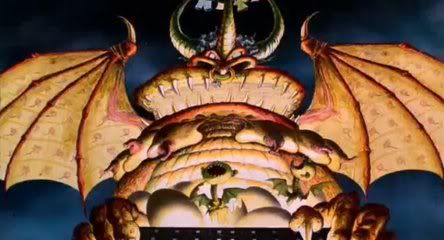
Even as he edged away from animation, Gilliam produced some fine work with his opening credits for the film, as well as one last sketch (about suicidal leaves) during the section on "Death." On the acting front, he commits not one but two completely bizarre characters to celluloid with his Jewish Rastafarian organ donor (the one who claims he can't donate his liver right that minute because, as he says, "I'm using it.") and the ostentatious Southern belle-type who recommends the Dungeon Room (with its "authentic medieval dungeon atmosphere") to the dull American couple during the section on "Middle Age." (Get it?) His finest role, however, is that of the American who won't stop talking and gets dressed down by Death as a result. (The captions don't catch what he says, but as the spirits of the now-deceased dinner guests get up to leave Gilliam insecurely asks his wife, "Do you think I talk a lot?") It's a far cry from the grotesques, grumblers and grunters he was usually called on to play and proves that he could hold his own with the other members of the group when the occasion called for it.
Eric Idle: After Gilliam, the Python most likely to work alone was Idle, and since films have less of a call for the one-man (or, at the very least, one-sided) sketches that were his specialty on the television series, it's not always easy to discern his contributions to the group's features. That's not really a problem with The Meaning of Life, though, since his niche as the group's main songwriter serves him in good stead here. First there's the "Accountancy Shanty," a song that was originally performed on Idle's post-Flying Circus sketch comedy series Rutland Weekend Television, which is put to good use in The Crimson Permanent Assurance. Then there's the title song, which establishes many of the themes that would be expounded on during the course of the film and features one of Idle's best vocal performances. That's equaled by his exceedingly clever "Galaxy Song," which is so profound that it even gets reprised over the closing credits, and the "frightfully witty" song he "tossed off in the Caribbean" and which serves as the profane precursor to Mr. Creosote's entrance. And he gets points for writing the tune for "Christmas in Heaven," which is so damn catchy that days later it's still in my head and probably will be for a long time to come.
As for his non-musical roles, Idle fares best as the sexually frustrated Protestant wife who clearly isn't getting enough at home, the World War I soldier who turns on his commanding officer (played by Terry Jones) when Jones seems ungrateful for the lavish gifts the squad has chosen to bestow on him while they're being shelled, the officer who loses his leg during the Zulu Wars and whose biggest complaint is that it "stings a bit," one half of the boring middle-aged couple who somehow thinks Selena Jones is a philosopher because her name begins with an S, and the mortified wife who served tainted salmon mousse to her guests. The two parts that are quintessential Idle, though, are the Zulu War soldier who rattles off a speech about the morality of killing during wartime (which, while heartfelt, is one of the weaker passages in the film) and that of Gaston the waiter, who, in the aftermath of Mr. Creosote's demise, leads the camera of a lengthy journey to the house where he was born. There he shares his personal philosophy, which isn't as profound as he probably thought it was when he first set out, but it gives the crew the excuse to pull off one of the most technically impressive shots in the whole film as the camera follows Idle out of the restaurant, down some stairs, out the front door and across a busy street -- all without a single cut. Sure, it's kind of show-offy, but whoever said showing off in a comedy was a bad thing?
Terry Jones: As the director of the film, Jones spends a lot more time behind the camera than he does in front of it (this was also the case with Life of Brian), but he really pulls out all the stops for the "Every Sperm Is Sacred" number, a visually extravagant sequence that sets a high-water mark that the rest of the film never quite manages to match. (I guess he shot his wad early.) Other highlights in terms of the directing are the World War I sequence, which was probably a nightmare to shoot but looks incredibly authentic, and the dinner party which is crashed by Death. (Coincidentally enough, those are the two scenes -- apart from the wraparound segments with the lot of them as fish in an aquarium -- that feature all six members of the troupe.) Then there's the "Mr. Creosote" sketch, for which Jones deserves a medal for pulling off while playing one of the most repugnant characters in the history of cinema. John Cleese may get the lion's share of credit for making it funny, but Jones is the one doing all the heavy lifting, in a manner of speaking. He also has a nice bit at the end as Maria the cleaning woman, who delivers a stirring soliloquy about her own search for the meaning of life (in rhyming couplets, no less), then nullifies it with her revelation that she isn't depressed about her lot in life because "At least I don't work for Jews." To say she gets what she deserves is an understatement, but I still feel bad for Jones the actor at that moment.
Michael Palin: Last but not least, there's likable everyman Palin, who scores early with his downtrodden mill worker who has to sell his children for medical experiments when he loses his job, and, with his Yorkshire accent intact, carries us through the opening bars of "Every Sperm Is Sacred" with aplomb. It's been said that Palin was the glue that held Python together and in this film he's the perfect utility player, popping up all in all sorts of places. I've already mentioned his role as the hospital administrator who knows nothing about actually running a hospital. (He could be put in charge of factory that makes toasters and it probably wouldn't make any difference to him.) He also put his stamp on the soldiers and officers he plays during the section about "Fighting Each Other" (in fact, his most memorable role in the whole film is probably the fanatical sergeant major who browbeats his entire squad out of his little scheme of marching up and down the square) and the intellectually incurious Midwesterner who orders a conversation about philosophy and then sends it back, saying it "isn't very good." He doesn't have much better luck with his attempts at logic as Debbie (wife of Terry Gilliam) in the dinner party scene, but she does nearly get one over on Death, which is nothing to sneeze at.
When you get right down to it, no matter how much praise I lavish on the individual members, a film like Monty Python's The Meaning of Life is a group effort through and through. There was a certain alchemy that happened when these six people put their heads together that simply can't be replicated. As a cinematic swan song, I doubt they could have asked for a better send-off. And as for the meaning of life itself, personally I find it comforting that there's somebody out there who thinks it can be boiled down to something as simple as "People aren't wearing enough hats." Just don't tell that to anyone who wakes up one morning and finds he has "one sock too many." That sort of thing would be liable to confuse the dickens out of them.
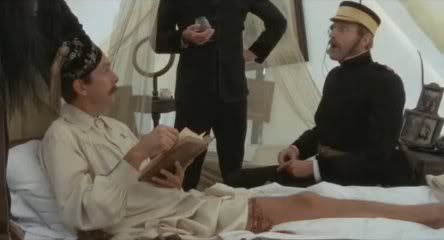
Up Next: Monty Python month concludes with a trip through time and space with a desperate band of international criminals. Well, going-to-be international criminals.

Incidentally, I would like to apologize to Messrs. Jones and Palin if it appears that I have given them short shrift in my write-up, but that's what they get for coming later in the alphabet than the others.